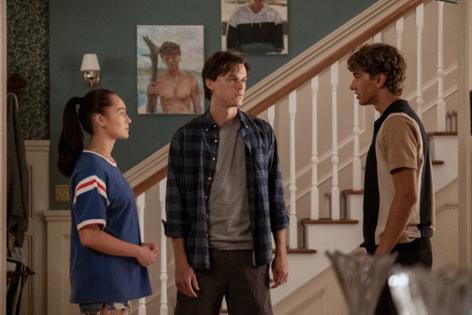Laura Yuen: Why adults are obsessed with 'The Summer I Turned Pretty'
Published in Entertainment News
One of my friends told me about the first time she laid eyes on her husband. This was decades ago, and mind you, she was already dating someone else. But when she saw this new mystery man throw a Frisbee (as young heartthrobs do), she said to herself, “Oh, man, I’m in trouble.”
I felt the same way after watching a couple of episodes of the teen drama “The Summer I Turned Pretty.” I was in trouble. There would be many days of binge-watching ahead.
I knew this because the series surfaced suppressed memories and unresolved feelings of my youth. I had all but forgotten what it was like to experience twitterpation every time your crush entered a room, that all-consuming and even nauseating intoxication of young love.
If the genre of young adult romance is not in your streaming algorithm, here’s what you need to know about “The Summer I Turned Pretty.” Based on a book trilogy by author Jenny Han, it tells a tale as old as time: the love triangle. Teen protagonist Belly must choose between two brothers she’s known her entire life. Jeremiah is playful and gregarious, familiar and comfortable. Older brother Conrad is brooding and emotionally overwhelming, but whose love for Belly is limitless. He’s been the object of Belly’s swoons ever since she was a little girl.
Season 3, its current and final season, is Amazon’s most watched season among women ages 18 to 34. Even those who don’t watch the show can get up to speed from all the clips on TikTok, where young and old people alike offer detailed analyses and profess whether they are on Team Jeremiah or Team Conrad.
My husband walked in on me while I was devouring the series. I mentioned that Conrad had the same kind of clear, entrancing eyes as one of the first guys I dated. (Suffice to say, it’s Team Conrad or bust for me.) “You’re really living vicariously through this show,” the husband told me.
That was putting it mildly. The show reminds older viewers about intense emotions that we didn’t comprehend when we were young, of heartbreak and regrets we once thought were unique but were in fact universal. It thrusts us back to a time when we felt the rush of not only desire, but being suddenly desired. While nostalgic, a good YA drama doesn’t gloss over the awkwardness and hardship of adolescence. It also makes us wonder: Was our skin ever that supple?
Enter the “reminiscence bump,” a psychological occurrence that explains why adults in midlife or older can remember in great detail events that took place when they were in adolescence.
I first learned about the reminiscence bump when reading the new book "First Love: Guiding Teens Through Relationships and Heartbreak." Journalist and author Lisa A. Phillips said we remember moments from our adolescence because they’re often linked to strong emotion. A first love amplifies those memories even more; we “never quite let go,” she told me.
Research shows that parents can experience a range of feelings also when their own children begin to date, Phillips said. Mothers are more likely to revisit past decisions and feel a sense of regret. Fathers whose sons are dating girls may experience a rise in their own self-esteem, as if their child’s appeal in the dating marketplace is somehow a reflection of theirs.
When Phillips interviewed parents for her book, many expressed concern that their child would make the same mistakes they committed. We see that play out in the Amazon series between Belly and her mom, Laurel. By the time Season 3 hits, four years have passed, and Laurel worries that Belly is marrying too young and will lose her identity, as Laurel did decades ago.
Phillips said she had to confront her own unresolved emotions when her 13-year-old daughter entered her first relationship. It was sweet and ended in heartbreak, as first loves often do.
“I just felt a really intense wave of vigilance come over me — and fears," Phillips said. “After doing some soul-searching, I realized that I was reacting this way because I had felt that my own love life, starting from my first relationship, had been more painful than gratifying. That was something I dearly wanted to protect my daughter from.”
The other emotion parents often feel when their child starts to date? Envy, Phillips said. They might feel wistful that their kid gets to experience love for the first time.
And maybe that’s why we, as parents, watch YA romances, even in midlife. The pains of adolescent relationships are often eclipsed by grown-up problems, from paying the bills to dealing with grief or illness. They seemingly don’t compare to broader systemic problems. Society tends to make light of puppy love.
“Part of the appeal of these shows is they take these stories, and in ways that can sometimes be saccharine and corny, they dig in and valorize them,” Phillips said. “They say this is worth three seasons of your attention.”
First loves are anything but frivolous. From a safe distance, a good teen drama gives us license to investigate those emotions and experiences that shaped us, even to this day.
———
(Laura Yuen is a columnist for The Minnesota Star Tribune.)
———
©2025 The Minnesota Star Tribune. Visit startribune.com. Distributed by Tribune Content Agency, LLC













Comments